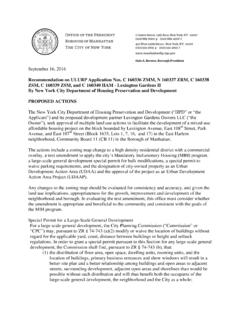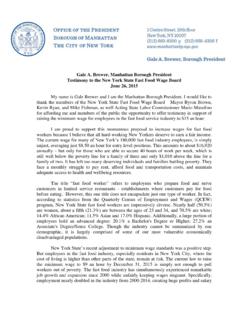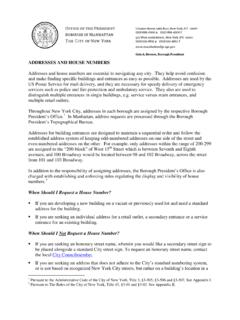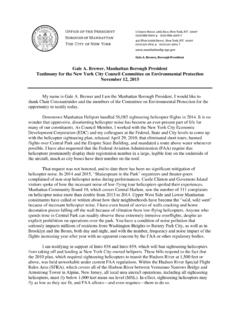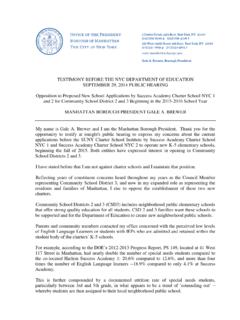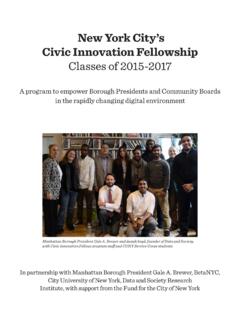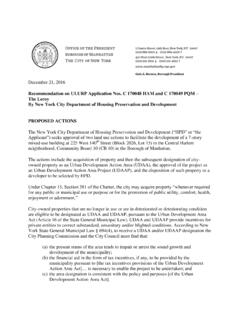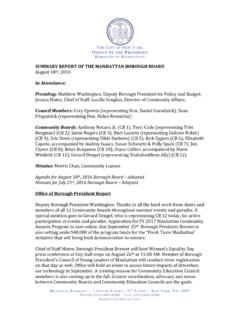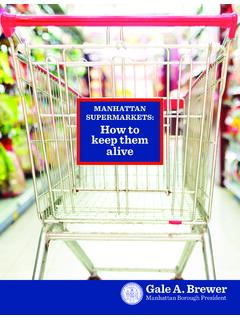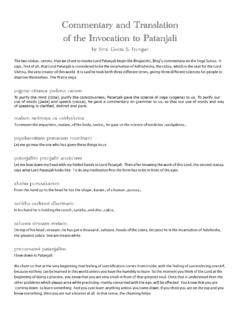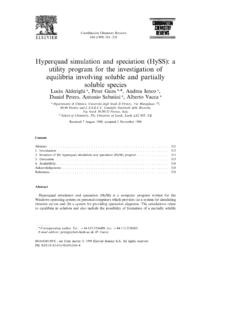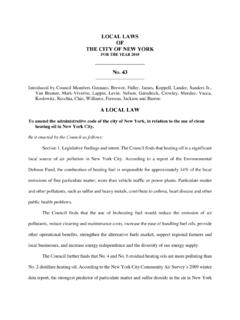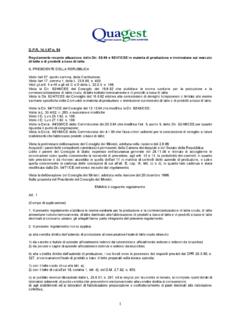Transcription of Testimony of Gale A. Brewer, Manhattan Borough …
1 Testimony of Gale A. Brewer, Manhattan Borough President Regarding New York City s Open Data Portal New York City Council Committee on Technology September 21, 2016 My name is Gale Brewer, and I am the Manhattan Borough President. I want to thank Chairman Vacca and the members of the Committee on Technology for holding this hearing. As you may know, I was the primary sponsor of Local Law 11 of 2012, the Open Data Law, as a member of the City Council. As Borough President, I am working closely with the Mayor to ensure its adequate implementation. Implementing the Open Data Law continues to be a major undertaking, and I would like to thank Department of Information Technology and Telecommunications (DoITT) Commissioner Anne M. Roest and Chief Analytics Officer Dr. Amen Ra Mashariki for their efforts. The excellent work of DoITT, the Mayor s Office of Data Analytics (MODA), and the Mayor s Office of Technology and Innovation make me confident that New York City will continue to lead the nation in municipal data initiatives.
2 I am proud of our city s influential position in open data and the thriving civic hacker community that is leveraging the many opportunities created by transparency. I want to discuss a few examples of how open data is revolutionizing the ways in which citizens and city government interact. Earlier this year, civic hacker Ben Wellington noticed that he kept getting ticketed for parking in front of sidewalk pedestrian ramps, even though a 2008 law sponsored by Councilman Gentile made such parking legal. Using NYC s Open Data portal, he looked at the city parking spots where such violations commonly occurred and found that the NYPD had issued over $ million in tickets for parking in these legal spots. When he contacted our office with his findings, we connected him to the appropriate office at the NYPD. Within a few weeks, the NYPD reported that it had sent a training message to all officers clarifying the 2008 rule change and communicated this to precinct commanders with the highest number of summonses.
3 The NYPD immediately worked to remedy this problem and is now monitoring these ticketing patterns. This example shows the power of open data to create new pathways for government to learn from citizens and for communities to realize they can make positive change happen. Open data also strengthens New York City s economy. The Mind My Business app by Vizalytics Technology makes small businesses more resilient by notifying the business owner whenever someone files a 311 complaint on noise, trash, or cleanliness so that the owner can be proactive about improving operations and avoiding a fine. This innovation enables citizens to use 311 to listen to their patrons and run better businesses. The more the City communicates through its data, the more everyone stands to gain. Accordingly, when datasets are updated with greater frequency, their data are more actionable.
4 The Open Data Law is an engine for economic development, and we ve only beginning to see its full potential. Open data is also a learning catalyst for New Yorkers in middle and high school. It can deepen students understanding of the neighborhoods where they live, go to school, and hang out with their friends. Open data will be fueling the Data Science curriculum that my office is developing through our Data Science Education Task Force. This curriculum will teach students skills they can apply in many fields, and more datasets across more agencies will expand their universe of study. We expect to pilot this new course in two high schools in the 2017-2018 school year. From watching and supporting the development of Manhattan s tech industry in communities like Harlem and Flatiron, I know that visionaries in this world learn by jumping in and getting their hands dirty.
5 That s why for the third year in a row I am welcoming CUNY Service Fellows to connect the achievements of civic tech to Manhattan communities. These Fellows are undergraduates from CUNY schools citywide and are learning about governance, community participation, data science, and of course open data from Noel Hidalgo of BetaNYC. This year, BetaNYC and the fellows have been charged with building tools to make open data more useful to the unique needs of Manhattan s 12 Community Boards. I would especially like to thank Mary McCormick from the Fund for the City of New York for making this program possible. The Open Data Law has brought the civic hacker movement to the forefront of good government oversight. Open data has become more than just transparency; it makes government more accountable, serves as a teaching tool for undergraduates and a pipeline to good jobs, empowers citizens and small businesses, and improves city services.
6 There is much progress to be made on this exciting front, and I will do all I can to ensure that the vision of 2012 continues to expand these initiatives, and that New York City remains a national leader in municipal data innovation.
